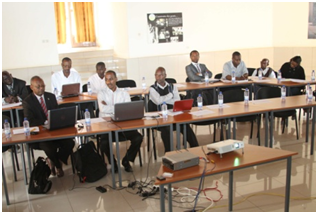Rwanda: Bringing local voices to local governance

Fostering good local governance is a crucial element in building a strong and lasting peace. It is at the local level that people can most easily participate in the design and implementation of government programmes and policies, ensuring that their needs and concerns are heard and addressed.
Because of the importance of governance to peacebuilding, one of the key goals of Interpeace’s local partner in Rwanda, the Institute of Research and Dialogue for Peace (IRDP), is to engage the Rwandan population and key stakeholders in seeking solutions for better governance through more participation of the population.
The Local Governance Barometer
The Local Governance Barometer is a tool based on a survey which will use a questionnaire to measure citizen’s opinions on the effectiveness of existing participation mechanisms and challenges in that area. Listening closely to what Rwandans have to say and aggregating the different opinions on local governance issues, the tool aims at bridging the gap between citizens, the local administration and their representatives at the national level.
Past research and dialogue with a broad sampling of the Rwandan population, including 1,200 questionnaires distributed and 40 focus group discussions held throughout the country, has indicated that citizen participation in government has been low. Following recommendations coming out of this research, IRDP will now guide the elaboration of a Local Governance Barometer. This will encourage both the participation of citizens in their government and more transparent management of public affairs.
The track record of IRDP shows that it is ready to take on this new challenge. In 2011 IRDP was one of only two NGOs honoured by the Rwanda Governance Advisory Council. It was recognized for its role in engaging with government and ensuring that local voices are heard by decision-makers.
Recently, IRDP researchers on the Local Governance Barometer held their first meeting with the working group that will accompany them throughout the research. Through the working group the researchers will interact with technicians and experts on the theme, gathering their input for the development of the Barometer and giving them a platform for exchange.
Among the 11 members of the working group that will help develop the Barometer are academicians, police officials, and representatives of NGOs such as Transparency International, Profemmes, Gender Monitoring Office and Commission Justice et Paix. There is also a representative from the Rwanda Association of Local Government Authorities and one from the local district of Nyarugenge.
At the inaugural meeting these members gave advice on how to handle the next steps in the process, expressed their appreciation of the initiative and acknowledged the importance of the working group. According to a member of the working group, “The Barometer needs advocacy at all levels to be adopted. It will be a very useful tool to all.”
